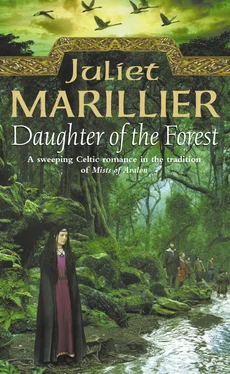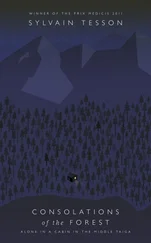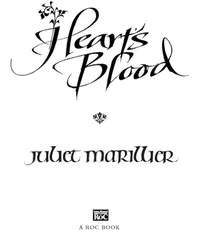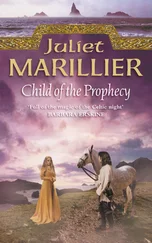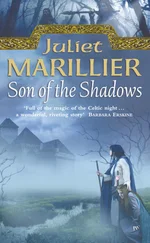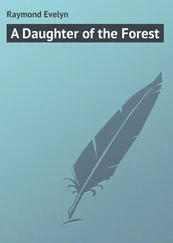Our home was named for the seven streams that flowed down the hillsides into the great, tree-circled lake. It was a remote, quiet, strange place, well guarded by silent men who slipped through the woodlands clothed in grey, and who kept their weapons sharp. My father took no chances. My father was Lord Colum of Sevenwaters, and his túath was the most secure, and the most secret, this side of Tara. All respected him. Many feared him. Outside the forest, nowhere was really safe. Chieftain warred against chieftain, king against king. And there were the raiders from across the water. Christian houses of scholarship and contemplation were ransacked, their peaceful dwellers killed or put to flight. Sometimes, in desperation, the holy brothers took up arms themselves. The old faith went underground. The Norsemen made their claim on our shores, and at Dublin they set up a ship-camp and began to winter over, so that no time of year was safe. Even I had seen their work, for there was a ruin at Killevy, where raiders had killed the holy women and destroyed their sanctuary. I only went there once. There was a shadow over that place. Walking amongst the tumbled stones, you could still hear the echo of their screaming.
But my father was different. Lord Colum’s authority was absolute. Within the ring of hills, blanketed by ancient forest, his borders were as close to secure as any man’s might be in these troubled times. To those who did not respect it, who did not understand it, the forest was impenetrable. A man, or a troop of men, who did not know the way would become hopelessly lost there, prey to the sudden mists, the branching, deceptive paths, and to other, older things, things a Viking or a Briton could not hope to understand. The forest protected us. Our lands were safe from marauders, whether it be raiders from across the sea or neighbours intent on adding a few acres of grazing land or some fine cattle to their holdings. They held Sevenwaters in fear, and gave us a wide berth.
But Father had little time for talk of the Norsemen or the Picts, for we had our own war. Our war was with the Britons. In particular it was with one family of Britons, known as Northwoods. This feud went back a long way. I did not concern myself with it greatly. I was a girl, after all, and anyway I had better things to do with my time. Besides, I had never seen a Briton, or a Norseman, or a Pict. They were less real to me than creatures from an old tale, dragons or giants.
Father was away for much of the time, building alliances with neighbours, checking his outposts and guard towers, recruiting men. I preferred those times, when we could spend our days as we wished, exploring the forest, climbing the tall oaks, conducting expeditions over the lake, staying out all night if we wanted to. I learned where to find blackberries and hazelnuts and crabapples. I learned how to start a fire even if the wood was damp, and bake marrows or onions in the coals. I could make a shelter out of bracken, and steer a raft in a straight course.
I loved to be out of doors and feel the wind on my face. Still, I continued to teach myself the healer’s art, for my heart told me this would be my true work. All of us could read, though Conor was by far the most skilful, and there were old manuscripts and scrolls tucked away on an upper floor of the stone fortress that was our home. These I devoured in my thirst for knowledge and thought it nothing unusual, for this was the only world I had known. I did not know that other girls of twelve were learning to do fine embroidery, and to plait one another’s hair into intricate coronets, and to dance and sing. I did not understand that few could read, and that the books and scrolls that filled our quiet upstairs room were priceless treasure in a time of destruction and pillage. Nestled safe amongst its guardian trees, hidden from the world by forces older than time, our home was indeed a place apart.
When my father was there, things were different. Not that he took much interest in us; his visits were short, and taken up with councils and meetings. But he would watch the boys practising with sword or staff or throwing axe as they galloped and wheeled on horseback. You could never tell what Father was thinking, for his eyes gave nothing away. He was a man of solid build and stern appearance, and everything about him spoke of discipline. He dressed plainly; still, there was something about him that told you, instantly, that he was a leader. He wore his brown hair tied tightly back. Everywhere he went, from hall to courtyard, from sleeping quarters to stables, his two great wolfhounds padded silently behind him. That, I suppose, was his one indulgence. But even they had their purpose.
Each time he came home, he went through the motions of greeting us all and checking our progress, as if we were some crop that might eventually be fit for harvest. We hated this ritual parade of family identity, though it became easier for the boys once they reached young manhood and Father began to see them as of some use to him. We would be called into the great hall, after we’d been quickly tidied up by whatever servant currently had the thankless task of overseeing us. Father would be seated in his great oak chair, his men around him at a respectful distance, the dogs at his feet, relaxed but watchful.
He would call the boys forward one by one, greeting them kindly enough, starting with Liam and working gradually downwards. He would question each of them briefly on his progress and activities since last time. This could take a while; after all, there were six of them, and me as well. Knowing nothing of any other form of parental guidance, I accepted this as the way things were done. If my brothers remembered a time when things were different, they didn’t talk about it.
The boys grew up quickly. By the time Liam was twelve, he was undergoing an intensive training in the arts of war, and spending less and less time with the rest of us in our joyous, undisciplined world. Not long after, Diarmid’s particular skill with the spear earned him a place beside his brother, and all too soon both were riding out with Father’s band of warriors. Cormack could scarcely wait for the day when he would be old enough to join seriously in these pursuits; the training all the boys received from our father’s master at arms was not enough to satisfy his thirst to excel. Padriac, who was the youngest of the boys, had a talent with animals, and a gift for fixing things. He, too, learned to ride and to wield a sword, but more often than not you’d find him helping to deliver a calf or tending a prize bull gored by a rival.
The rest of us were different. Conor was Cormack’s twin, but he could scarce have been less like in temperament. Conor had always loved learning, and when he was quite little he had struck up a bargain with a Christian hermit who lived in a hillside cave above the southern lakeshore. My brother would bring Father Brien fresh fish and herbs from the garden, with maybe a loaf or two scrounged from the kitchens, and in return he was taught to read. I remember those times very clearly. There would be Conor, seated on a bench beside the hermit, deep in debate on some fine point of language or philosophy, and there in a corner would be Finbar and myself, cross-legged on the earthen floor, quiet as fieldmice. The three of us soaked up knowledge like little sponges, believing in our isolation that this was quite usual. We learned, for instance, the tongue of the Britons, a harsh, clipped sort of speech with no music in it. As we learned the language of our enemies, we were told their history.
They had once been a people much like us, fierce, proud, rich in song and story, but their land was open and vulnerable, and had been overrun time after time, until their blood became mixed with that of Roman, and of Saxon, and when at last some semblance of peace had come about, the old race of that land was gone, and in its place a new people dwelt across the water. The holy father told us that much.
Читать дальше
